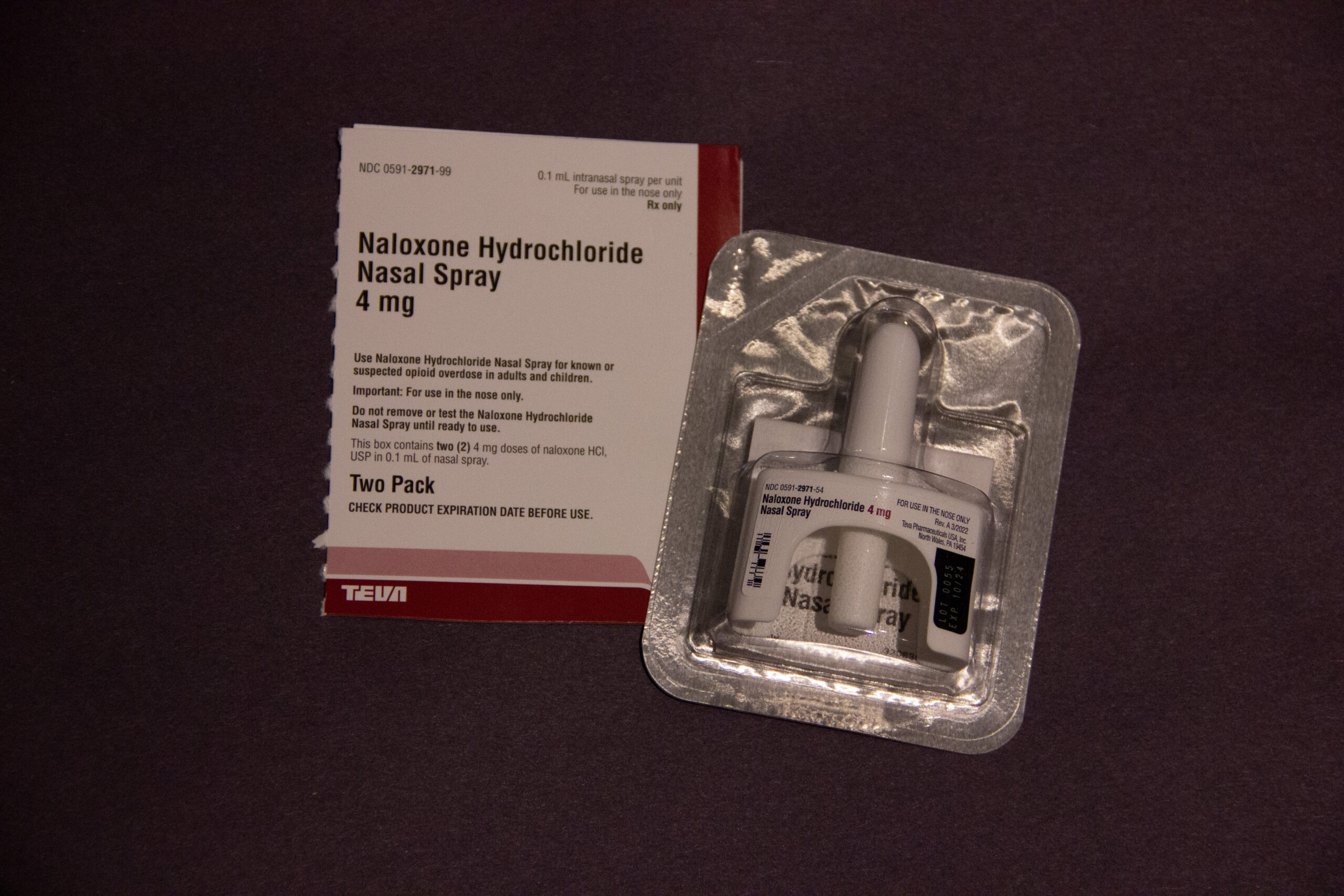Narcan kit supplies. PHOTO CREDIT: Kelly Mackay | Contributing Reporter
Narcan, a medication used in emergency situations to reverse opioid overdose, was approved for over-the-counter use by the United States Food and Drug Administration (FDA) on March 29.
Previous to this approval, Naloxone, the generic name for Narcan, was only available as a prescription drug, and could only be accessed at a pharmacy. Naloxone has been available with a prescription since 2015. The new over-the-counter approval will allow pharmacies and other stores to sell the brand name Narcan without a prescription.
While the approval for over-the-counter use will make Narcan more accessible to many people, University of Rhode Island students have had access to this medication for a few years, according to Dr. Christopher Nasin, the medical director of Health Services.
Health Services has had Naloxone in their pharmacy since 2018. Students can get it any day of the week and don’t need to have a prescription. Nasin is able to put in a standing order at the pharmacy, so any student who asks for Naloxone can get it.
“We really want to knock down any barrier we can to access Naloxone,” Nasin said.
While there is usually a co-pay depending on a student’s insurance, Health Services offer all of their prescriptions at a subsidized cost to make it more accessible.
Another resource for students to access Naloxone is the Community First Responders Program (CFRP), run by Dr. Anita Jacobson, a clinical professor at URI. In their office in Morrill Hall, room 219, students can access free Naloxone kits, which she is able to give out with a prescription label. They also give out safer smoking kits and fentanyl test strips. Everything is anonymous, and they have a “no questions asked” policy when students ask for these things.
According to Jacobson, with Naloxone easier to access, it is important to know how and when to administer the life-saving medication.
Jacobson also described how the medication works. According to her, Naloxone works on an opioid overdose by binding to opioid receptors more strongly than the opioids themselves. A person who is overdosing may have slowed or completely stopped breathing and would be unresponsive. There is no harm in giving Naloxone, even if the person is not overdosing on opioids.
“You’re not going to harm someone with Narcan,” Nasin said.
According to Nasin, if someone had other drugs in their system, Naloxone will not make the situation worse. However, Naloxone only works to restore breathing on an opioid overdose, and other first aid measures should always be done.
“We are worried that people may be forgetting to do their CPR and other things because they’re so focused on the Narcan piece,” Jacobson said. “Still do all the things you would do with your first aid; still call 911, still do CPR, and still look for a medical alert tag, because also not everything is an overdose.”
She said another concern is Xylazine, a horse tranquilizer, added to many street drugs.
“It’s going to cause profound muscle relaxation and sedation,” Jacobson said. “It’s in street drugs, and it can make people very sleepy for six to eight hours. It’s affecting overdose response.”
Even after administering Narcan, someone with Xylazine in their system may not wake up, even if breathing is restored. She also mentioned that after administering Naloxone, place the person on their side to protect their airways if vomiting should occur.
According to Jacobson, the Community First Responders Program also offers Naloxone training. They have six online learning modules featured on their website. In addition to this, groups and organizations can also request naloxone training, and someone from the program will meet with the group to give in-person instruction.
Jacobson also mentioned that currently all PharmD URI 101 classes are required to have Naloxone training. Students typically appreciate the training, as it is an important part of having a career in health care.
“I felt that it was critical to absorb and understand the information provided to me,” said first-year pharmacy student, Fionna Leblanc. “Dr. Jacobson was not being facetious when she told us that having Narcan on hand is the difference between life and death.”
The CFRP currently has the capacity to administer Naloxone training to any major who wants to add this to their URI 101 course.
“I think it is critical that other healthcare professionals and other students receive this training,” LeBlanc said. “The number of deaths via opioid overdose drops significantly when Narcan is available.”
While URI students already have ample access to Naloxone, the new over-the-counter approval will make this medication more accessible to others who are not on a college campus.
“It’s really about time that the FDA approved Narcan as an over-the-counter medication, because it is a life-saving medication,” Nasin said. “Every year there are over 100,000 opioid-related deaths, many of which are due to Fentanyl.”
For students struggling with drug addiction, URI has many resources to get help. Arielle Sherman, therapist and drug specialist, works with Health Services on their Health Promotion program. Students can contact her if they are seeking treatment for drug or alcohol abuse.
The CFRP is also able to help students find treatment programs. You can visit them Monday-Friday between 8 a.m. to 4 p.m. at Morrill Hall in room 219.

